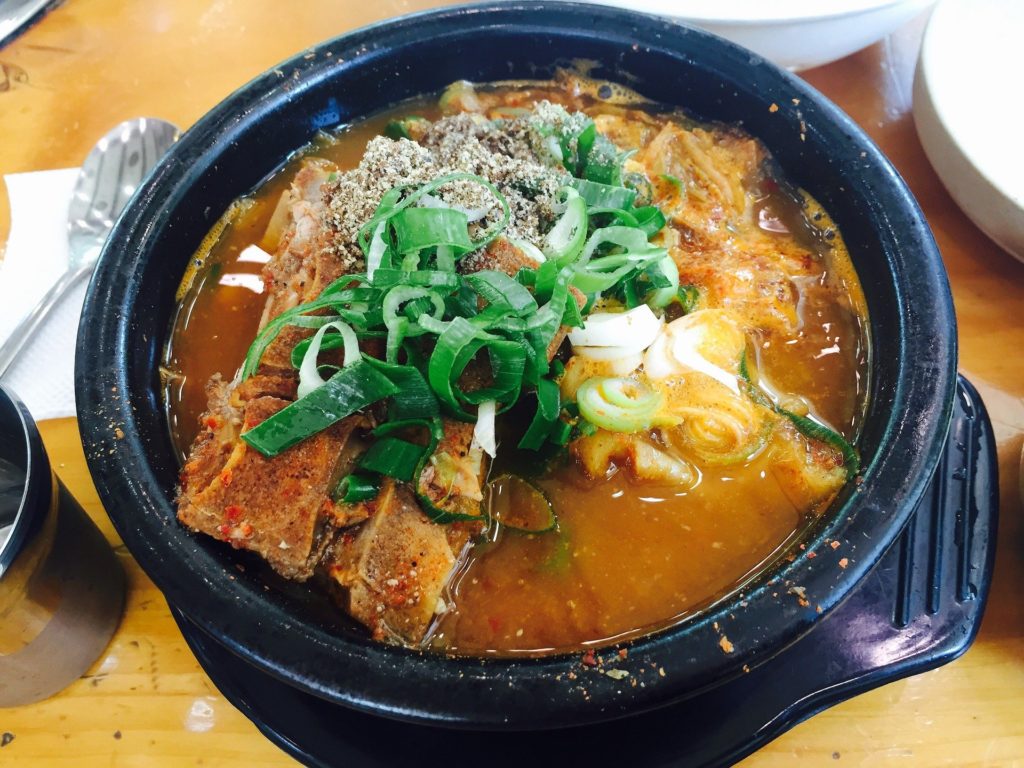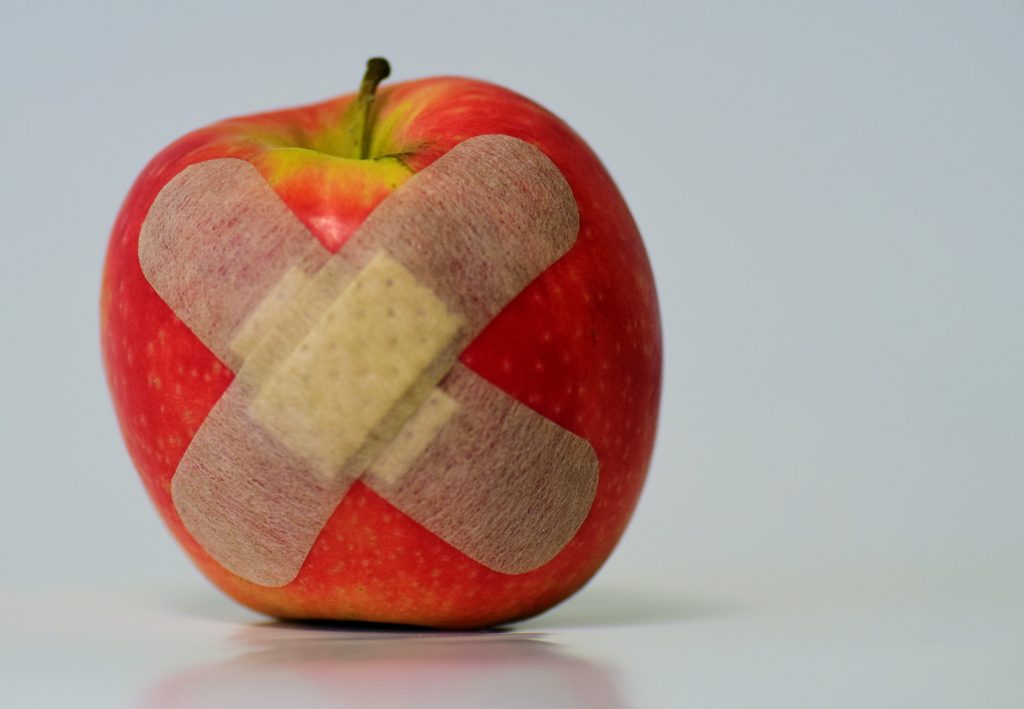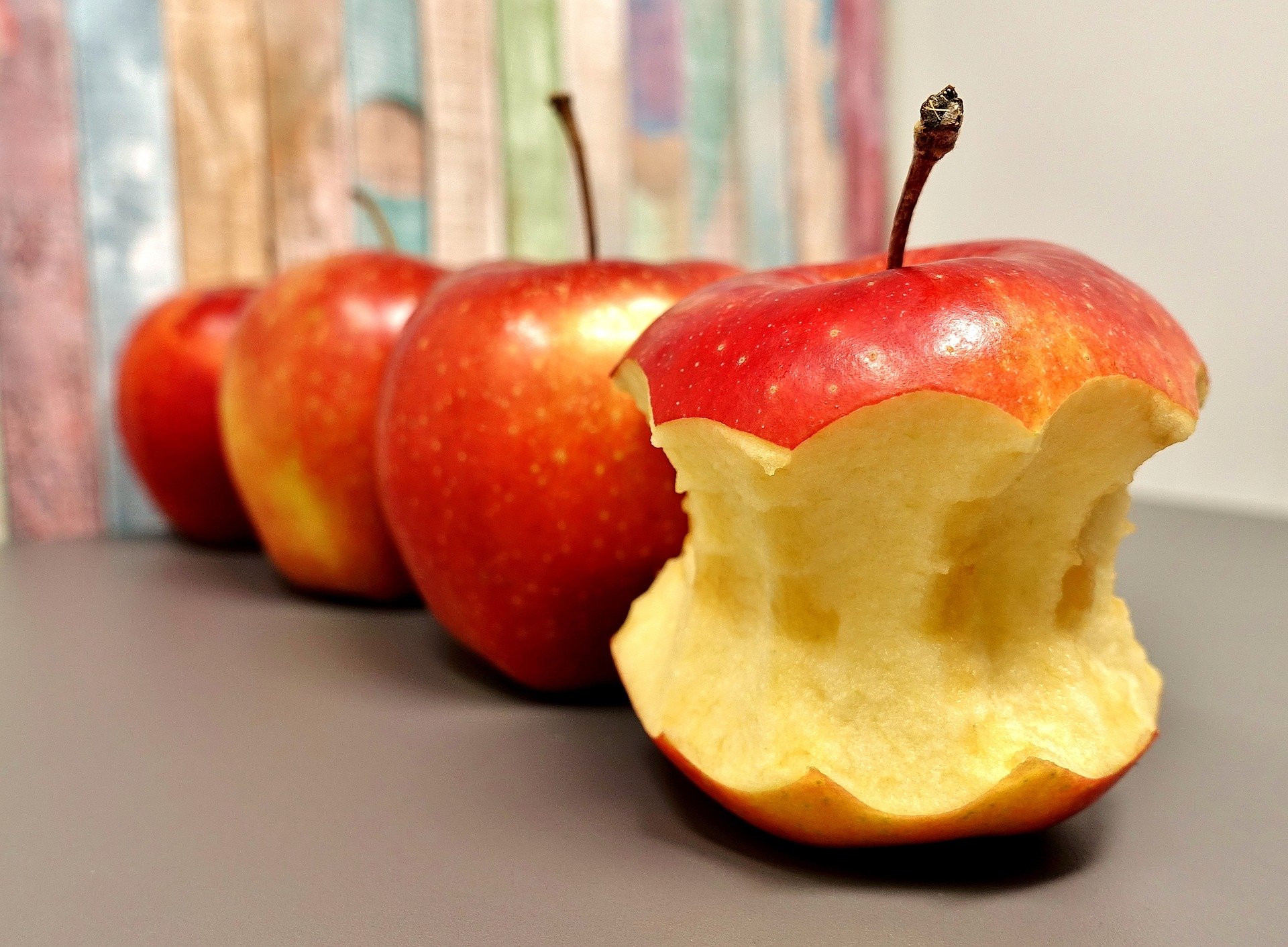The Mystifying Powers of Korean Foods
Apples and Haejang Stew
If you have been invited to a Korean restaurant or to a Korean’s home for a meal, you are sure to have heard “Try some of this; it is good for your health.” It seems that every Korean food is especially good for protecting against or remedying one ailment or another. So it is with haejang-guk for hangovers. In this issue, we revitalize Stephen Redeker’s article “Hangover Stew” (Gwangju News, April 2013). Some foods are thought to be healthful only when eaten at certain times and to be avoided at others. This is true of apples in Korea. Stephen Redeker also contributed the expose “Eating Apples at Night” (Gwangju News, August 2012), which we have also revived and present to you here. — Ed.
Hangover Stew
After spending the late-night hours with friends and consuming large amounts of alcohol, a popular Korean tradition is having a bowl of haejang-guk (해장국, hangover stew) to combat the excruciating effects of a hangover. The name derives from haejyeong (해졍, 解酲), literally “relief from the bottle.” It has been long believed that the powers of this particular dish in the morning will help to dissipate the ravages of a hangover. Is this just a myth, or is there some truth to this?
First, it is important to consider what causes a hangover. The main culprit is a loss of water in the body. Alcohol is a diuretic, causing the body to drain itself of liquid, including from the brain. This is why you feel a headache after waking up in the morning from a bout of drinking the night before. The liver and kidneys have been working overtime to filter out the toxins from the alcohol. Thus, the body is also depleted of salts, sugars, and electrolytes. The best way to remedy this is by adding these back into the bloodstream.
Nutritionists have provided a menu of foods and drinks that can help alleviate the effects of a hangover. The most important is water. Drinking a few glasses of water before going to sleep can prevent a bad hangover. If the hangover has already struck the next morning, water will still help rehydrate the body. Some other drinks that help nourish the body are sports drinks (they add electrolytes and sugar), fruit juice (sugar and vitamins), pickle or sauerkraut juice (sodium and vinegar), tomato juice (lycopene antioxidant), and ginger and peppermint tea (soothes the stomach).
Hunger can strike during a severe hangover. It is best to stick to foods that do not irritate the stomach but will add the necessary nutrients to the blood that the body needs. Eggs for breakfast would be a good choice, as they contain amino acids that help break down the toxins from the alcohol. Soups, such as chicken noodle or miso, are helpful because they contain salt and are easy on the stomach. Potassium-rich foods like bananas, kiwis, and spinach are also beneficial. Honey helps restore blood sugar levels and should be consumed in tea or with toast.

Some foods and drinks to avoid, contrary to popular opinion, are greasy foods, coffee and caffeine, orange juice, and the “hair of the dog” (any alcoholic drink taken to cure a hangover). Greasy foods with meat are good to eat before a night of drinking. Consuming these foods the next day can irritate the stomach or dehydrate the body further.
This brings us back to haejang-guk. Does it really have what you need to cure that hangover? Haejang-guk often contains pork, doenjang paste (similar to miso), onions, garlic, ginger, pepper, mushrooms, cabbage, and sprouts mixed with a hot beef broth. There is no doubt that this delicious hot bowl of wholesome stew can cure a raging hunger, but is does not contain all hangover-dissipating ingredients. It is spicy, and consuming spicy food can cause one to sweat, releasing those hangover-inducing toxins. Because it is spicy, it will also cause you to drink more water, which will combat the dehydration and ease the pain. But it is missing the sugars and electrolytes needed to replenish the body. This dish may be harsh on the stomach, especially for the uninitiated. The ingredients contained in a bowl of haejang-guk will actually absorb alcohol, which will help to prevent a bad hangover, so a bowl of haejang-guk as a meal before party time would also be a good idea.
Haejang-guk comes in a wide variety of styles. There is seonji haejang-guk (선지 해장국), which contains cow or pig blood and is popular in the Daegu area. Ppyeo haejang-guk (뼈 해장국) is made with the broth of slowly boiled pig bones. Popular in Gangwon-do, where walleye pollock are caught on the east coast, are hwangtae haejang-guk (황태 해장국) and bukeo haejang-guk (북어 해장국), the latter of which is made of dried pollock. In the Jeonju area, kongnamu haejang-guk (콩나무 해장국), made with bean sprouts and an anchovy broth, can most easily be found. Jeju-do’s haejang-guk is commonly called mom-guk (몸국) and is made with mojaban (모자반, sargassum seaweed) boiled in pork broth.
But you do not need to wait to have a hangover, or anticipate one, to have a bowl of haejang-guk. This traditional dish is quite tasty on its own in any of its regional varieties.
Eating Apples at Night
“An apple a day keeps the doctor away.” This adage is taught to most Western children as a way of verbalizing that apples are very healthy to eat. In theory, if we eat an apple every day, we will be so healthy that we will not need a doctor. Although this may be an exaggeration of the health benefits of apples, we must agree that this is one healthful fruit. Koreans too agree, but with one caveat.
Korea has the saying “A morning apple is gold, an evening apple is poison” (아침 사과는 금, 저녁 사과는 독). This encapsulates the belief that eating an apple at night is actually unhealthy, as it would be difficult for one’s stomach to digest, hence causing indigestion. This would lead to a sick feeling and make it difficult to get a good night’s sleep. This appears to be a well-established belief in Korea. Younger Koreans say that they have heard this from an elder at some point in their life, and there are those who, because of this saying, refrain from eating apples before bedtime.
The fact that apples are healthful is no mystery, but does this change when eating them at night? Eating food before going to bed is generally a bad idea because foods that are spicy, heavy, or fatty will make it difficult to sleep soundly. Apples, however, have none of these properties and are actually filled with vitamins, minerals, and antioxidants that are beneficial for sleeping. Apples help to decrease blood pressure, improve breathing, and lower blood sugar. They also help the body to secrete serotonin, causing the nerves to relax more easily, all of which help to provide for a good night’s rest.
Apples also contain polyphenols (antioxidants), which are found mostly in the apple peel. They assist the body in breaking down carbohydrates and regulating blood sugar, providing a steady level of energy (rather than creating an energy spike that may keep one awake).

Most of an apple is really just water, but the peel contains a large amount of the dietary fiber pectin, which gently helps to stimulate bowel movements when the “gold apple” is eaten after breakfast. This fiber is also good for digestion and cleans the colon. In addition, pectin helps remove carcinogens and heavy metals from the body.
However, the reason why the “gold apple – poison apple” maxim developed has a lot to do with pectin and bowel movements. Pectin, which stimulates bowel movement, can put a strain on the digestive function of the intestine in the evening. While sleeping, the undigested fiber causes gas to form. This may cause frequent visits to the toilet at night and an uncomfortable feeling in the morning. In addition, the organic acids in apples can increase the acidity of the stomach and cause irritation, so eating apples in the evening or at night before going to bed is better to avoid.
For the person with a healthy digestive function, however, apples can safely be eaten at any time of day. It is the person whose digestive system is not in the best condition who should be more careful not to eat apples before sleeping. Years ago, when this “gold apple – poison apple” adage originated, it must be remembered that the average Korean did not enjoy the fine diet and high degree of health that is enjoyed today. In those times, “A morning apple is gold, an evening apple is poison” rang much truer than it does today – and that is, of course, a good thing!
Original text by Stephen Redeker.
Supplemented by David Shaffer.
Resources
1.Han, H. (2018, December 4). 밤에 먹는 사과, 정말 毒? Health Chosun News. https://m.health.chosun.com/svc/news_view. html?contid=2018120303080
2.Kim, J. (2018, April 13). “아침 사과는 금, 저녁 사과는 “독”은 진실? Asia Gyeongje. https://www.asiae.co.kr article/2018051114501038657
3.Lee, G. (2012, October 19). “아침에는 금사과,” 저녁에는 독사과” 라고 불리는 이유는? Health Chosun News. https://m.health. chosun.com/svc/news_view.html?contid=2012101801922
4.Namu-wiki. (2020, November 30). 해장국. https://namu.wiki/해장국







